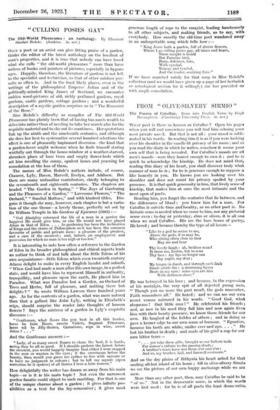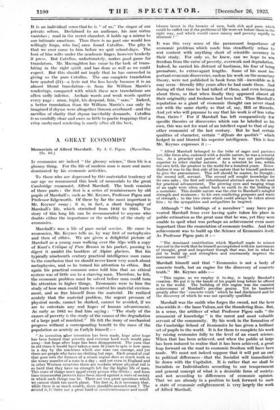FROM " OLIVE-SILVERY SIRMIO "
The Poems of Catullus. Done into English Verse by Hugh Macnagliten. (Cambridge University Pre. 5s. net.) WI:AT poet is there so human as Catullus ? Open his pages when you will and somewhere you will find him echoing your most private mood. But that is not all : your mood is subli- mated in his words. In reading him it is as if you were looking over his shoulder in the candle-lit privacy of his room ; and as you read the diary in which he writes, somehow it seems your own self that is being revealed. For Catullus's moods are all men's moods—were they honest enough to own it ; and he is quick to acknowledge the kinship. He does not mind that, reading this diary of his heart, you shall discover truly what manner of man he is ; for he is generous enough to suppose a like honesty in you. He knows you are looking over his shoulder and does not count his privacy spoiled by :vows presence. It is that quick generosity in him, that lively sense of kinship, that makes him at once the most intimate and the most open of poets.
Reading him, you forget the centuries that lie between, and the differences of blood : you know him for a man. For Catullus is outside time and locality, as no other poet is. No historic sense is needed when we come to him, nor any pictorial sense even : to-day or yesterday, elms or olives, it is all one when we read Catullus. His are the bare bones of poetry. He loved ; and became thereby the type of all lovers-
" Like to a god he seems to me, Above the gods, if so may be, Who sitting often close to thee May see and hear Thy lovely laugh : ah, luckless man I It stuns me, Lesbia, but to scan Thy face : my lips no longer can Say aught, my dear ; My tongue is dumb, and through each limb Steals subtle fire : a drumming hymn Beats in my ears : mine eyes are dim With darkness sheer."
He was betrayed in his love ; and became, in the expression of his nostalgia, the very spit of all dejected young men. " Though you no more the past recall, the gods remember, Faith remembers all." Ire hated ; and we can see our own secret venom mirrored in his words. " Good God, what eloquence that little cuss 1" He celebrated his friends ; and, as now in his need they fail him and now again liven him with their hearty presence, we know those friends for our own. He laughed at the foibles of others ; and in doing so gave a keener edge to our own sense of humour. " Egnatius, because his teeth are white, smiles ever and aye. . . . " He lost his brother in death ; and made of his grief a cup for our own bitter tears-
" . . . yet take these gifts. brought as our fathers bade For sorrow's tribute to the passing shade ; A brother's tears have wet them o'er and o'er ; And so, my brother, hail, and farewell evermore."
And on the dry plains of Bithynia his heart ached for that smiling all-but island of his home ; till in olive-silvery Sirmio we see the picture of our own happy anchorage while we are men.
More than any other poet, then, may Catullus be said to be " of us." Not in the democratic sense, in which the words were first used : for he is of all poets the least democratic.
It is an individual sense that he is " of us," the singer of our private selves. Declaimed to an audience, his rare virtue vanishes ; read in the secret chamber, it holds up a mirror to our intimate emotions. Thus there is no poet one would less willingly forgo, who has] once found Catullus. The pity is that we ever come to him before we quit school-days. The best of him wilts under the academic finger, however tenderly it press. But Catullus, unfortunately, makes good game for translators. Mr. Macnaghten has come to the task of trans- lating in the right spirit, and has done as well as we could expect. But this should not imply that he has succeeded in giving us the pure Catullus. The one complete translation here quoted (51)—a lyric not the less lovely because it is an almost literal translation—is from Sir William Marris's renderings, compared with which these new translations are often sadly inferior. Archaic words and weak words spatter every nage: anon, bight, his despond, fain, " sans." Indeed, a better translation than Sir William Marris's can only be imagined if rhyme were altogether thrown overboard—and the sacrifice of clarity that rhyme inevitably demands. Catullus is so candidly clear and owes so little to poetic trappings that a crisp unrhymed rendering is surely after all the best.







































 Previous page
Previous page